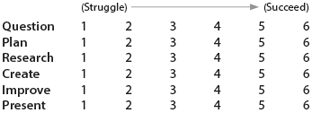Web page: "Inquiry Process," U of IL at Urbana-Champaign
Critical Thinking and the Inquiry Process
Critical thinking enables you to delve deeply into a topic, separating its parts to examine them. It helps you sort through possibilities, deciding what to keep and what to throw away. While creative thinking broadens your focus, critical thinking narrows and sharpens it. Seeking an ever finer focus, critical thinking is convergent. Critical thinking is important to each step of the inquiry process, as shown in the text and chart below.
Critical Thinking | Inquiry Process |
Connect Connect with a topic by activating your prior knowledge, asking initial questions, getting a sense of the whole, and considering its importance. | Question |
Commit Commit your time, energy, and other resources to learn about the topic. Decide how to proceed. | Plan |
Read Read to learn, listen to learn, expand your vocabulary, examine ideas, gather information, assess its reliability, and organize your research. | Research |
Express Express what you have learned, defining, describing, interpreting, inferring, analyzing, arguing, and concluding. | Create |
Evaluate Evaluate what you have created. Check your logic and conclusions, resolve ambiguities, entertain alternatives, and reconstruct meaning. | Improve |
Share Share what you have learned with others, teaching and debating. | Present |
Your Turn Examine your own critical thinking during the inquiry process. Rate it from 1 (struggle) to 6 (succeed) at each step. The strategies in this chapter will help you improve.

